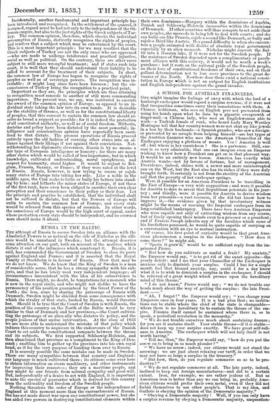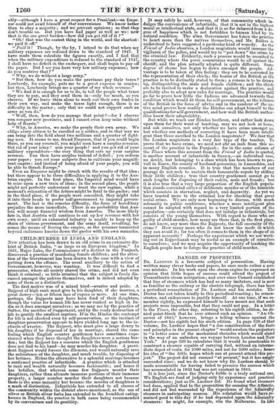A SCHOOL FOR AUSTRIAN FINANCIERS.
ONE might imagine the feelings of envy with which the lord of a bankrupt exchequer would regard a surplus revenue, if it were not that incapacities sometimes carry their consolations with them. A Chinese nobleman, who sees an English peer not prevented from using his hands upon what he lists by a gigantic overgrowth of finger-nail—a Chinese lady, who sees an Englishwoman able to walk—a Turkish female of rank, who heard Lady Mary Wortley Montague tell that her countrywomen were not shut up like jewels in a box by their husbands—a Spanish grandee, who saw a foreign- er prevented by no scruple from helping himself—are but types of the Austrian financier who sees the American Chancellor of the Exchequer enjoying a plethora of means. Yes ! America is well off ; but where is her escutcheon ? She is a parvenue. Still, suc- cess is so very admirable, that one can imagine even an Emperor wishing to know how a President can get on in that pleasant way. It would be an entirely new lesson. America has exactly what Austria wants—not by favour of fortune, but of management. Providence, indeed, shines with a newer and more uninterrupted sun on the West, but the East also has its riches if they were duly brought forth. It certainly is not from the sterility of the Austrian soil that the poverty of her exchequer springs. Were it possible for an American President to be travelling in the East of Europe—a very wide supposition ; and were it possible for Austria to dare to arrest that Republican potentate in his jour- ney ; and thirdly, were it possible for Austria to derive wisdom from her prison6rs—a vast resource, if she did but know how to improve it,—the evidence given by that involuntary witness might be the means of rescuing the Imperial exchequer from its long-established bankruptcy. There have been Austrian Emperors who were capable not only of extracting wisdom from any source, but of freely openiirsn their minds even to a prisoner or a president; and if Francis Joseph inherits any of the faculties which some of his forefathers possessed, he would be quite capable of carrying on a conversation with an eye to mutual instruction.
Of course, his first point of curiosity would be that great Ame- rican phenomenon a surplus in the exchequer. " How does it come there ? " he might ask.
" 'Spects it grow'd," would be no sufficient reply from the im- prisoned Pierce.
" But how do you cultivate so useful a fruit? My anxiety," the Emperor would say, " is to get rid of the exact opposite—the yearly deficit : and I see that your Chancellor of the Exchequer is anxious only to diminish your surplus. Could I but for a single month feel that blessed anxiety, nay, could I for a day know what it is to wish to diminish a surplus in the exchequer, I should be relieved of a great weight which presses upon the hereditary mind of this throne."
" I do not know," Pierce would say ; " we do not trouble our heads much about the way of getting the surplus : the late Presi- dent —"
" Ah, I forgot !" the Emperor would cry ; " you change your Emperors once in four years. It is a bad plan that ; no institu- tions can be stable where the chief of the state is changeable— where there is no hereditary tie to sustain the throne of the em- pire. Finance itself cannot be sustained where there is, so to speak, a periodical revolution in the monarchy."
" We do not trouble ourselves much about sustaining finance ; for you see it sustains itself. Your stable throne—if it is stable— does not keep up your surplus exactly. We have great self-reli- ance in America. The exchequer which will not help itself is not worth having." " Tell me, then," the Emperor would say, "how do you put the screw on to bring in so much plunder ? "
" We have no screw ; indeed, our citizens would not stand the screwing : we are just about relaxing our tariff, in order that we may not have so large a surplus in the treasury."
" But how, then, do you regulate commerce so as to be pro- ductive ?
" We do not regulate commerce at all. The late, indeed,
inclined to keep out foreign manufactures—and did certain extent. Iron, for example, we are rather jealous of. But as American iron is better than any we can bring in, probably? Ame- rican citizens would prefer their own metal, even if they did not forbid themselves to use other people's. That is my idea, and Guthrie is obeying the opinion of the Democratic majority." " Obeying a Democratic majority ! Well, if you can only have a surplus revenue by obeying a Democratic majority, unquestion- ably—although I have a great respect for a President—an Empe- ror could not avail himself of that convenience. We know better than to obey a majority ; and we prevent opinions ; so that they don't trouble us. But you have had paper as well as we: now that is the one great bunlen—how didyou get rid of it ? "
"Oh! that was the easiest thing in the world, and the shortest : we paid it off."
" Paid it ! Though, by the by, I intend to do that when my military expenses are reduced down to the standard of 1847. I have made them calculate the figures exactly, and I find that when the military expenditure is reduced to the standard of 1847, I shall have no deficit in the exchequer, and shall begin to pay off the paper. But I see you have very low military expenses; how do you contrive that?
"Why, we do without a large army."
"But then, how do you make the provinces .pay their taxes ? Lombardy, for example, puts me to a great expense in armies; but then, Lombardy brings me a quarter of my whole revenue."
"We find it is enough for us to do, to tell the people what taxes they are to pay, and they send them in—only too much, as you observe. If we leave them alone to work out their own trades in their own way,' and make the taxes light enough, there is no difficulty in the matter ; only that we could not support such an army as you do."
"'Well, then, how do you manage that point ?—for I observe yen conquer new provinces, and I cannot even keep mine without help of Russia."
" Why, in America, we make the people their own army. We oblige every citizen to be enrolled as a soldier, and in that way we can bring into the field about two millions and a quarter of fight- ing men. It seems to me, friend Emperor, that if you could begin there, as you say yourself, you might soon have a surplus revenue. Get rid of your army ! arm your people! and you get rid of your military expenditure—the very thing that eats up your surplus revenue. You then have surplus instead of deficit ; you redeem your paper ; you set your subjects free to cultivate your magnifi- cent empire ; and instead of being afraid of your people, you will be able to thrash Europe."
Even an Emperor might be struck with the results of that idea ; but there appear to be three difficulties in applying it to the Aus- trian empire. In the first place, the Imperial mind would have to seize upon a new train of ideas; in the second place, the people might not perfectly understand or trust the new regime, while a moment's relaxation of the fetters might be fatal to the gaoler; and in the third place, if the people were consulted, they might take it into their heads to prefer self-government to imperial govern- ment. The last is the remoter difficulty, the force of hereditary prejudice the more immediate. There is no probability that Aus- tria will accept financial wisdom from America. The more likely fate is, that Austria will continue to eat up her revenue with her own army, until an exhausted industry is unable to keep up the chain of vicious government, and the army itself, revolting, be- comes the means of freeing the empire, as the prisoner tormented beyond endurance knocks down the gaoler with his own manacles.



































 Previous page
Previous page